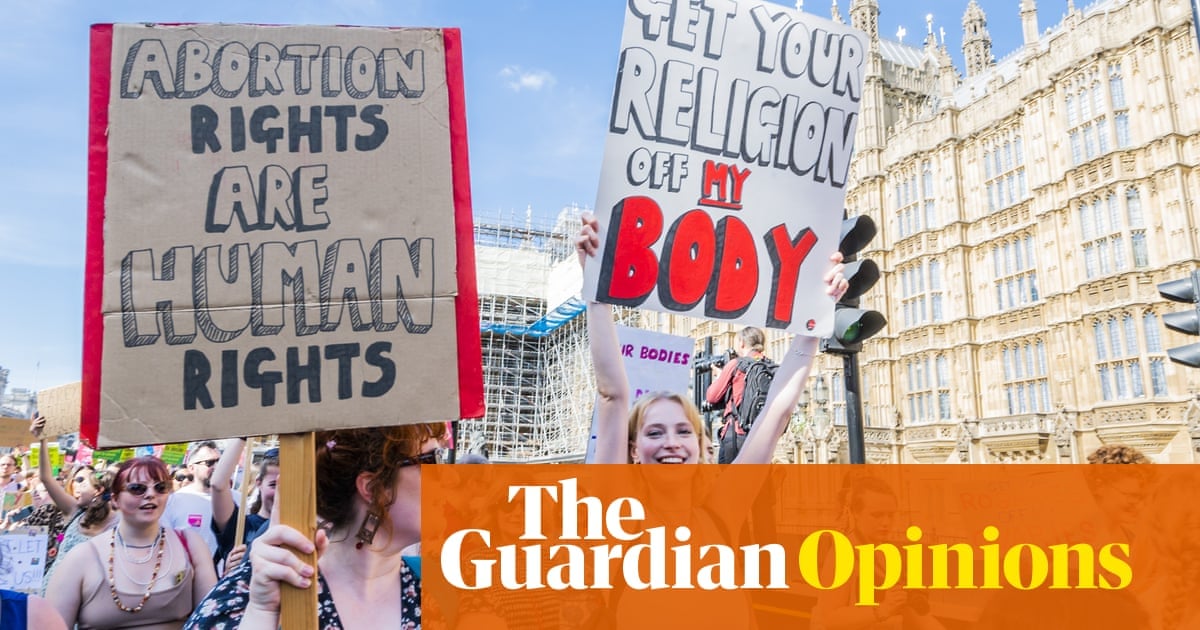Roughly 36 hours after I first heard about the horrifying Maga taunt “your body, my choice”, I learned that I was pregnant, despite having a contraceptive coil. My relief that I lived in the UK, not the US – where abortion is rapidly becoming illegal or inaccessible at best – was profound. Yet I realised that I had no idea how to access abortion, having complacently assumed that it would always be available if I needed it. Some fraught Googling led me to the British Pregnancy Advisory Service. A couple of days later, I had my first appointment and very quickly learned that it wasn’t purely “my choice”, even in Britain.
Of all the words you don’t want to hear by surprise, “transvaginal” is up there. I thought the scan to determine how pregnant I was would be the kind where a technician slathers goop on your stomach. I wasn’t told until I arrived that it would be internal, because of the assumed early gestation. A second surprise: the coil was gone, most likely sucked out by my period cup. Later that day, I had a phone consultation. The nurse told me two doctors would have to sign off on the termination and asked me to justify why my life would be negatively affected if I were forced to continue with the pregnancy. Horrified, I said I should just be able to say: I don’t want to. She was extremely kind and agreed, but said this was a legal requirement under the Abortion Act.
I told her I lived hundreds of miles from my partner. We hadn’t been together very long and were united on this. I lived in a one-bedroom flat. I could barely afford my own life. My career would suffer. The presence – or so I thought – of a coil should show that I had been actively warding against pregnancy. What more did she want? I am bullish in the face of authority I disagree with, but felt furious for any less headstrong person seeking an abortion – already grappling with guilt and overwhelmed at dealing with the medical establishment – who might doubt their own needs when confronted in this way.



When you believe in an all powerful space fairy, it’s quite easy to believe in other arbitrary nonsense too. QAnon was an interesting phenomenon, as it was uniting the crystal woo hippy left antivax crowd into the magical space fairy religious right. And the radicalization pipeline took it from there.
It’s not necessarily religion that is the problem here. It’s that people who don’t have critical reasoning skills are drawn to religion. But they’re also drawn to whatever other bullshit anyone is peddling.
Excuse me a moment, I need to adjust my magnetic bracelet and turn on my Himalayan salt lamp.
"Religion makes a good man good and a bad man bad.” Journalist Chris Hedges
…at least the salt lamps look kinda cool?
Full agree. As a geoscientist, I am of the strong opinion that we should use more rocks in decorative contexts ;)
So you’re not supposed to lick them?
Wait, people think those do anything besides glow?
Yes. Yes they do. I used to work with a lady who swore that her life had been changed by her Himalayan salt lamp.
She was very crunchy.
Not in all cases, sure. But in quite a number of them religion is encouraging that kind of behavior. They tell themselves and others to have faith, to not rely upon evidence, that testing god is a sin, etc. They actively discourage critical thinking and reasoning skills, which is a catalyst for the more dangerous stuff like qanon, anti vaccine rhetoric, etc.
We might still be in this boat without religion, but at the very least we’d have less holes.
My biggest problem with religion is that it perpetuates abuse, of all sorts, on all ages and genders.
Right. And it’s the people exploiting those spaces for their own goals.
I agree that critical thinking could likely reduce the problem (though I think equal education access is difficult and religion is still harmful in communities that have been denied proper access to education). However, religious zealots purposefully create these education vacuums so if religion is tolerated then it will slowly deprive society from equal education access.
Religion just seems to inevitably make shit worse.
I do completely agree that this isn’t limited to WASPs - psuedo-religious bullshit like crystals and fortune telling perpetuate the same issues… they tend to be less well organized but given time small faiths seem to entrench themselves. There is an excellent example of this in the meteoric rise of Scientology.
Tbh it’s not just evangelicals. It’s fundamentalists of every stripe, whether they be gov’ts or religions (or a mix of both in some cases). Even courts can be like that (looking at you SCOTUS).
Trying to ‘go back to a simpler time’ by re-enacting laws and rules that thwart the basic fundamentals of democracy is stupid at best.
I agree, but I tend to use evangelicals because they are the worst and clearest example.
I know Catholics who were far more fundamentalist than many of my former evangelical friends were.
Again, fundamentalism is the precursor for people to decide that they are the only ones who know the “right” way to think, to live, to speak. Only they are saved, only they know the true path, etc etc etc.
And never forget that Christian fundamentalism is no different than Muslim or Hindu or Buddhist versions. They all rely on cultish ways to deny their neighbours the freedom to believe or to even live.